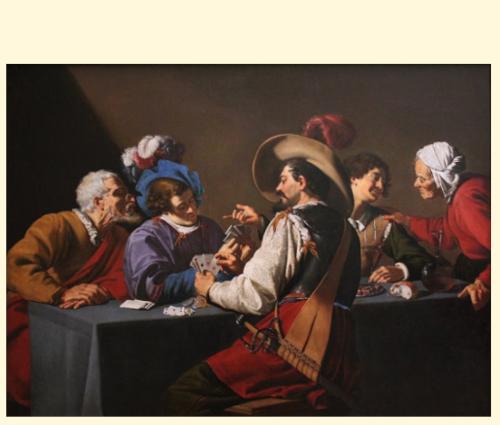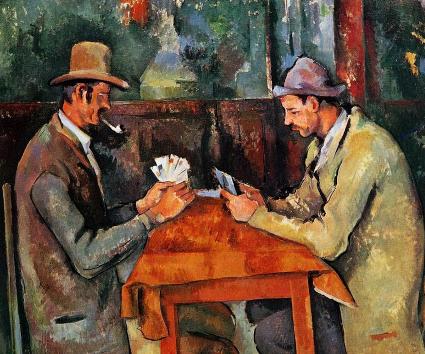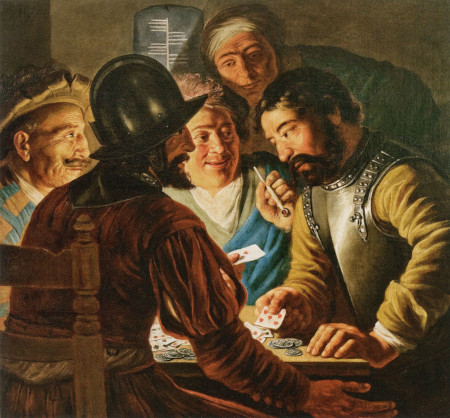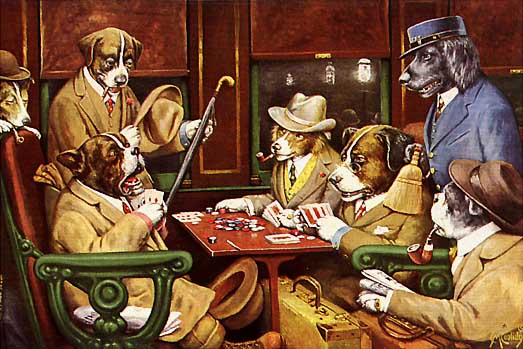Great Little-Known Card Games

Try these great little-known card games...

| Game | Players | Level | Description |
|---|---|---|---|
| 500 and Persian Rum | 2-6 | Easy | One of the best scoring rummies |
| Fortune Rummy | 2-8 | Medium | A forgotten but entertaining scoring rummy from the 1930s and 1940s |
| Skarney | 2-4 | Hard | This unusual rummy introduces several unique features. Like Canasta, it's a sophisticated game that takes a while to learn but really engages players |
| Skarney Gin | 2 | Easy | Innovative gin rummy in which you offer discards to opponents |
| Colonel | 2 | Easy | A Gin variant that is unusual in that you make table melds |
| Iceberg | 2-5 | Medium | The pressure builds in this rummy, as each meld is worth more than the last |
| Pip-Pip! | 3-12 | Easy | Great trick-taking game for large ad hoc groups. Participants change the trump during play |
| Ninety-Nine | 2-5 | Medium | Elegant game for three. You secretly predict how many tricks you'll take and try to hit that mark |
| Jo-Jotte | 2 | Hard | Highly-recommended for bridge players. A great substitute for contract bridge for a twosome. |
| Quinto | 4 | Medium | Well-designed game where you win tricks with cards that total 5 |
| Bid Whist | 4 | Medium | Whist with a twist -- normal card rankings can be reversed |
Card Game Descriptions
By Howard Fosdick © BestFreeNewGames.com
We've played card games for years and run across a number of fantastic ones that, for whatever reason, aren't nearly as popular as they are fun. Here we describe these games and why you'll like them.
Scoring Rummies
Let's start with several "scoring rummies". Rummy games are defined by their sequence of play. In his turn, each player draws one or more cards, tries to meld them, and discards. In scoring rummies, the emphasis is on scoring as many points as possible by placing melds down on the table.
500 Rummy is one of best scoring rummies. I grew up playing it as a kid and was surprised later in life to find out that many people elsewhere in the U.S. had never heard of it. It appears in a few card books but isn't as popular as it should be.
The game works well for any number from two to six players. Four players can play Partnership 500 Rummy, or the closely-related Persian Rummy. Persian Rummy modifies the rules slightly from the parent game.

Fortune Rummy is another scoring rummy from the midwest. Said to be popular in the 1930s and 1940s, it appears to have been lost to history as rummies evolved in other directions. It's still a great game for any small group from two to eight. It treats the discard pile differently from 500 Rummy and makes a nice contrast as a scoring rum.
Skarney was invented by the card expert and magician John Scarne. It's a highly-developed, sophisticated form of rummy that compares to Canasta in the sense that it requires learning intricate rules. Yet it pays off as a game that will continue to amuse for some time. If you're looking for an intellectually appealing rummy , Skarney might be your ticket. Skarney introduces a few new concepts including its lack of a discard pile (instead, you directly offer discards to other players).
John Scarne included Skarney in many of his best-selling card and gaming books, yet the game never caught on. Given what it offers, that's too bad. This may be the only website that offers the rules for Skarney. Now, you can learn and play it to your heart's content.
Gin Rummies
By "gin rummies", we refer to rummy games in which the goal is to go out or "rummy". Piling up scores by playing melds to the table is not part of the game. The emphasis is on rummying rather than scoring points during the hand.
First up, Skarney Gin. Also invented by John Scarne, this game adds a new type of meld to the traditional group and sequence melds. It's called a poker meld and it requires three or more cards in sequence -- regardless of their suits.
Like Skarney, the game has no discard pile. You directly discard to other players. In sum, Skarney Gin introduces several new gaming concepts and offers a fun alternative for Gin Rummy fans. Skarney Gin is easy to learn.
Iceberg was invented by Alaskan Gordon Bower in 1997. Its distinguishing feature is that, as sequence melds lengthen, their value increases. Since players can lay off cards on others' melds, the increased point value of adding cards to existing melds drives the game.
Should you put that meld down now, and score for it before your opponent rummies? Or will that meld only provide fodder for more scores from your opponent?
I know of no other rummy that features this concept, and it makes for a tense, exciting game.
Trick Taking
And now, on to trick-taking. You'll see among our selected games several new twists on this oldest of memes.
Pip-Pip! is an easy, fast game for large groups. Rules are simple, but hilarity runs high. It's reported to have been a favourite of Londoners during the blitz of the Second World War. That makes sense because it's amenable to all ages and skill levels, and takes but minutes to learn.
We highly recommend Pip-Pip! for large groups where players may need to settle on a game with rules that can be quickly and easily explained.

Ninety-Nine was invented by British card and games expert David Parlett. He created it because there are few excellent trick-taking games for three, and also to explore the concept of "precision bidding". Each player makes a separate, secret bid for how many tricks they'll win. And then players blindly contrive to win that exact number, while their opponents do the same.
Ninety-Nine is one of those few invented card games that has spread into popular use. It's routinely listed in games books and at online websites. If I had a single word to describe the game, I would call it "elegant".
The game features many variations. We present Mr Parlett's favoured rules for three, as well as those for the four-person version.
Here's another great game you've probably never heard of.
It was invented by Bridge expert Ely Culbertson. Culbertson didn't invent contract bridge (as some erroneously believe), but he certainly did more than any single person to popularise it in the 1920s and 1930s. Some would go so far as to say that, if it weren't for Mr Culbertson, contract bridge never would have achieved the worldwide acclaim it enjoys today.
Culbertson was an outlandish character. He grew up in the Russian Empire of the early 1900s as a rich man's son, and soon found himself scheduled for execution as a social revolutionary during the 1908 revolution. He ultimately fled to America where he made his fortune -- in bridge. Thought to be abrasive by some, others admired his innovative publicity techniques. These were radically new at the time but today are commonly accepted. Read more about Ely and the strange lives of this one man in our biography here.
And so, Jo-Jotte. After he maneuvered contract bridge into general acceptance, Culbertson looked for new mountains to climb. He settled upon inventing the best trick-taking two-hander in the world. He came up with Jo-Jotte, which maps bridge scoring and principles onto a game that is played worldwide under a variety of names. Examples of its varied incarnations include Clobyosh, Clob, Klaberjass, Kalabrias, Bela, Darda, and Belote.
Unfortunately, Ely didn't enjoy the same success in popularising Jo-Jotte as he did with contract. It was a beautifully designed, engrossing game for two, yet it died stillborn to the public.
If you enjoy bridge, we highly recommend Jo-Jotte. It's perfect for when you have a partner instead of a foursome.
If you find Jo-Jotte off-putting in its complexity, try our own unique variant that emphasizes playability and easier rules. You can find Kobber Nuggie here.
Quinto reminds one a bit of Ninety-Nine. It's an elegantly crafted game. But whereas Ninety-Nine was specifically designed for three players, Quinto suits foursomes.
Quinto was invented by John Angelo Lewis, aka Professor Hoffman, around 1900. Mr Lewis was the most famous magician of his era, which spanned the late 19th and early 20th centuries. He spent much time with playing cards and wrote several highly regarded books on the topic.
In Quinto, the goal of each partnership is to win tricks with cards adding up to 5. For example, a tricks with an Ace and a four, a two and a three, or any 5 spot. Another innovation is that all suits have a natural order for trumping. In other words, there is no single trump suit, but instead, the four suits have a permanent rank order as trumps when played out of suit.
Quinto is altogether a fine game for two partnerships. It takes little time to learn yet offers entertainment as players adjust to its unique system.
Here's whist with a twist. You can bid to win tricks with either normal or reversed card rankings.
The game requires some mental agility to decide how to bid and play your hand. It's popular among African-Americans and deserves wider acclaim.

Dogs Playing Poker by Cassius Marcellus Coolidge (1844-1934)